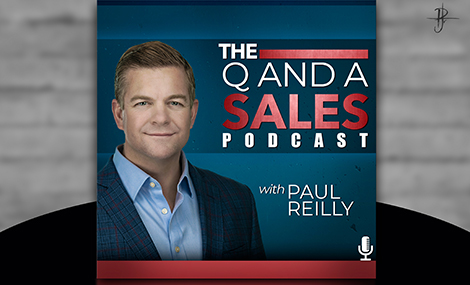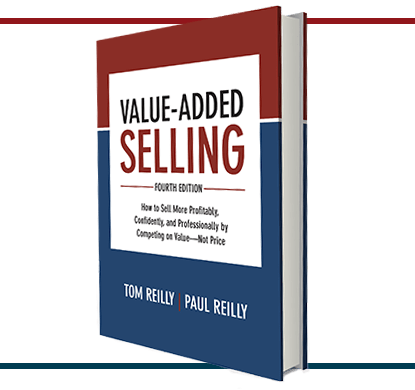On this episode, Paul tackles why salespeople should not have discounting authority.
Show Notes
Don’t talk yourself into a price objection!
“When the buyer’s asking you to make some concessions, you’re the one that has the choice.”
Salespeople who discount lack confidence in their….
“The #1 reason why salespeople will discount is because they can.”
The sales manager should have ultimate pricing authority.
Click here to purchase the latest copy of Value-Added Selling!
Thanks to our editing team at The Creative Impostor Studios. Click here to book a complimentary consultation with Andrea to find out how they can partner with you in creating your own podcast. Check out Paul’s interview on Podcast Envy here.
***
Our show is updated weekly with the questions you ask. So, please go to the home page, subscribe, share it with your friends, but most importantly, ask the question that you want answered.
Thank you for tuning in. Make it a big day.
My salespeople are negotiating for the customer. How do I get them to stop?
(Transcribed from podcast)
Today, we have a question coming from the website. This question is from Leslie. Leslie is actually a sales manager, and here’s what she is dealing with. And I know many sales managers out there can relate to this. She says that her salespeople, they are actually negotiating for the customer rather than negotiating for their company.
Here’s, what’s basically happening. Her salespeople are going out there trying to win deals. And then, when it comes time to actually shipping the product, the customer has to pay the freight. Let’s say the product that they’re shipping is extremely heavy. They might spend $1,000 on the actual product, but the shipping could be as much as $300. As soon as they start dealing with that, the salespeople are saying, “Look. Our customers, they’re not going to accept that as the cost of doing business. We’ve got to give them a discount. We’ve got to cover the freight. We’ve got to do this. We’ve got to do that.” Basically, the salespeople are more interested in negotiating for the customer than they are for their own the company.
So, that’s what we’re going to address on today’s show. And this is just a reminder, go to the website, ask us a question and we are going to turn it into a show, just like we are doing for Leslie.
Now, before we get into the actual show, quick shout-out to Andrea over at The Creative Impostor Studios. Andrea does a wonderful job. Again, podcasting is such a great way to connect with your audience, to build an audience. Whether that audience is your customers, colleagues, or just anyone, find a way to connect [to] them. Podcasting is such a great way to do it. Reach out to Andrea and her team. She can help you. Whether it’s from setting up the tech side of it, or just talking through the show, figuring out a theme, she’s there for you. We’re going to have a link to her website on this episode’s webpage. So, check it out.
Also, pick up your latest edition of Value-Added Selling. In Value-Added Selling, we talk about discounting and maintaining the right attitude. This book is your go-to guide on how to sell value. If you’re sick and tired of dealing with price objections, you’ve got to pick up your copy. It’s available at Amazon or wherever you get your books.
Let’s get into that question. How do I stop my salespeople from negotiating for the customer instead of for our own company? We’ve got to remember, the salesperson that is starting to negotiate for the customer before they even get a price objection, they are talking themselves into a price objection. What’s interesting about Leslie’s scenario here, she mentions that they start trying to negotiate for the customer before the customer even gives them a price objection. And, I’ve seen this with salespeople in the past. When I’m either coaching them in the field, or I’m interacting with them in a seminar, I’m amazed at how often salespeople will give a discount before the buyer even asks for it. Now, what this tells me, it’s a salesperson that lacks confidence in their solution. It’s a salesperson that seems too focused on helping the customer versus holding the line when it comes to price. So we need to address that.
Leslie, I’ve got a few tips for you here to help you with your sales team. First things first, your sales team needs an attitude adjustment. If your salespeople are telling themselves, mentally, that the customer will never pay for that, or they’re never going to accept that as the cost of doing business, or, they’re never going to go for that freight charge, or, we have to give them a discount. If this is how they are talking to themselves, they are mentally defeated before they even begin the conversation.
So, here’s an exercise. I would reach out to your sales team—whether it’s virtual, in person, whatever you do—and have them each detail a scenario where they told the customer the freight cost, and they told the customer they have to pay for the freight cost, and the customer ended up paying for the freight cost. Okay. I know this sounds pretty straightforward, but what you’re trying to do is get each salesperson to think of an example where they told the customer what the freight charge was, and the customer ended up paying that freight charge. What you’re doing with this exercise, you are giving them proof that customers will pay for that freight.
And, by the way, this works for any sort of price objection. If you are a salesperson, and, let’s say you believe that your price is too high. You might be telling yourself, they’ll never pay this price, or, they’re never going to pay the asking price or the list price, whatever it might be. I want you to think of a scenario— think of a scenario where you gave the customer the price and they paid the full price. Think about it. Write out – detail what you did, how you presented it. While you’re doing that, it’s reminding yourself of the value, and it’s also reminding you that customers are willing to pay that price.
Now, I should caution you. This reminds me of a group I was working with just a couple of years ago. This group had several salespeople, well-tenured salespeople, very experienced, and their company was typically, they were typically the higher-priced solution in the market. They were complaining about price and they said, “You know, our price is always too high. The only way we can win business is if we discount.” And I said, “Okay. Let’s think about this for a minute.” I said, “I’d like each of you in the room, I’d like you to think of a scenario when the customer asks you for a discount, but, you did not give the discount. You held the line on pricing.”
I pause for a few moments to let all the salespeople think. There were probably 20, 30 salespeople in the room. And after a few minutes, I said, “Who can share an example of where they actually help the line on pricing and what happened?” Nobody’s raising their hand and this wasn’t a shy group. And, so, I said, “What’s going on?” The owner of the company actually said, “Paul, I think I know what’s going on. None of them can recall an instance where they actually held the line on pricing,” and everyone nodded their head. It turns out this group has never held the line on pricing. Whenever the buyer asked for a discount, they gave him a discount.
And so, what I would encourage you to do, again, when the buyer’s asking you to make some concessions, you’re the one that has the choice. You can decide whether to give that concession or not. But ask yourself, when’s the last time you actually held the line on price and you put it out there and said that’s just the way it is, that’s the price or that’s the freight fee, whatever it might be. I tell you, it’s going to make you a little nervous if you haven’t done it in awhile, but, you have to put it out there. If you’re not losing one out of every six deals because of price, you’re probably not charging enough.
So, again, Leslie, that first tip— have each one of your salespeople think of a scenario where they actually charge the full freight to the customer and the customer went through and they actually paid for it. If none of them can think of an example of when that’s actually happened, I would say it’s probably because they’ve never had to do it.
That brings me into my next piece. And this one’s for you, Leslie. You are the sales manager. You’re the one who should have ultimate control here. So, when your salespeople come to you and say, “Hey, I know this customer. They’re never going to go for this,” or, “I know this customer and they’re not going to pay this freight. They’re not going to pay a full price,” it is up to you to go back to them and say, “That’s the price they’re going to pay.” You, as the sales manager, you should have ultimate pricing authority. If your salespeople have pricing authority, I would take away their pricing authority immediately. They should be given a price, there should be no leniency, and that’s what they should have to do. They should have to go out there and present that price.
The number one reason why salespeople will discount or negotiate or make concessions is because they can. Simply take away their ability to discount or to negotiate on behalf of the customer, and that’s going to eliminate half the battle right there. The other half is being able to mentally get their head around the fact that customers will pay for it if they decide to ask for it. So, keep that piece in mind—remove their ability to discount. Don’t even give them parameters that they can discount within. Salespeople will discount to the parameters that are given. If they’re allowed to discount 10 percent off, they’re going to discount 10 percent off.
This is a little more strategic on the pricing side of it. If you’re constantly running into this freight objection where customers don’t want to pay that added cost—and this goes for anyone that’s selling a solution where there are add on pricing things, whether it’s installation costs, shipping costs, training costs, whatever it might be, implementation costs—package that into the pricing of the solution. Package in the pricing. When people see one price, it’s simple and it’s easy. And if they start complaining the price is just a little bit high, you can explain it. “Look, included in our price is all the value that you’re going to receive.” And you can talk about your value added, but you can also talk about the logistical support, you can talk about the complimentary delivery that is included. It’s simple, it’s easy. Consider packaging in the pricing so that they just have one number to look at.
Leslie. Those are the tips. I hope they help out.
Make it a big day.


